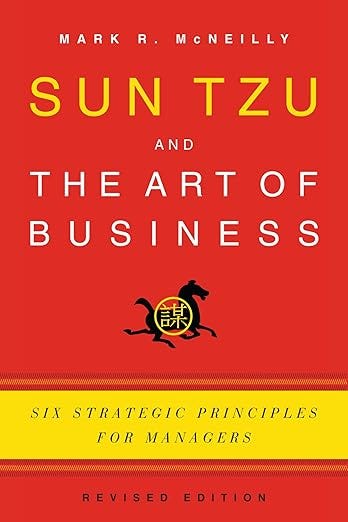“Strategy without tactics is the slowest route to victory. Tactics without strategy is the noise before defeat.”
More than two millennia ago the famous Chinese general Sun Tzu wrote the classic work on military strategy The Art of War. Now, in Sun Tzu and the Art of Business, Mark R. McNeilly shows how Sun Tzu's strategic principles can be successfully applied to modern business situations.
Here are really two books in one: McNeilly's synthesis of Sun Tzu's ideas into six strategic principles for the business executive, plus the entire text of Samuel B. Griffith's popular translation of The Art of War. Within, McNeilly explains how to gain market share without inciting competitive retaliation, how to attack a competitor's weak points, and how to maximize the power of market information for competitive advantage. He also demonstrates the value of speed, preparation, and secrecy in throwing the competition off-balance, employing strategy to beat the competition, and the need for character in successful leaders. In his final chapter, McNeilly presents a practical method to put Sun Tzu and The Art of Business into practice. By using modern examples throughout the book from GE, Microsoft, AT&T, BMW, Southwest Airlines, FedEx, and many others, he illustrates how, by following the wisdom of history's most respected strategist, executives can avoid the pitfalls of management fads and achieve lasting competitive advantage.
Key Lessons from Sun Tzu and the Art of Business:
Know Your Market and Competition: Just as Sun Tzu emphasized knowing the enemy, businesses must understand their competitors’ strengths and weaknesses to gain a strategic advantage.
Attack Weak Points: Focus your efforts where competitors are most vulnerable rather than engaging them directly in areas where they are strong.
Value Speed and Agility: Quick, decisive action can give your business an edge, just as speed was a critical element in Sun Tzu’s military strategy.
Preparation is Key: Success comes from thorough preparation, which allows you to anticipate challenges and respond effectively.
Balance Strategy and Execution: A strong strategy is crucial, but it must be paired with disciplined execution to achieve goals.
Avoid Unnecessary Conflict: Gain market share and expand strategically without provoking retaliation or unnecessary competition.
The Importance of Leadership: Character and integrity in leadership are essential to earning trust and achieving long-term success.











